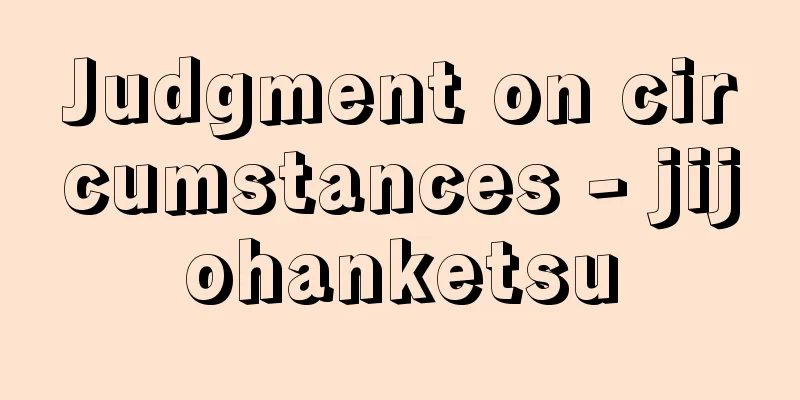Judgment on circumstances - jijohanketsu

|
A system for dismissing requests for the cancellation of illegal administrative actions for reasons of public interest (Article 31 of the Administrative Case Litigation Law). Administrative actions are made based on the principle of administration by law, and in principle, if they are illegal, they will be cancelled by the court. However, if a dam is completed or a land readjustment project is completed during the litigation, it is socio-economically unreasonable to restore the original state, even if it is illegal. Therefore, in this case, as an exception to administration by law, the cancellation request is not recognized, and instead, consideration is given to compensation for damages and other matters. The judgment declares in the main text that the action is illegal. This system, if abused, can have an anti-rule-of-law function, so it must be applied with care. This system is applied to lawsuits for unconstitutionality of the apportionment of seats in the Diet, which is unconstitutional because it violates the principle of equality, but since invalidating the election would cause the inconvenience of there being no Diet members in the electoral district, the Supreme Court has applied the principle of judgment of circumstances to make the election valid (July 17, 1985). However, there is a minority opinion that the election is invalid, and a supplementary opinion is added that the next election will be invalid. [Yasuhito Abe] Source: Shogakukan Encyclopedia Nipponica About Encyclopedia Nipponica Information | Legend |
|
違法な行政処分の取消請求を公益上の理由で棄却する制度(行政事件訴訟法31条)。行政処分は法律による行政の原理に基づき行われるもので、違法であれば裁判所により取り消されるのが原則である。しかし、係争中にダムが完成したり、区画整理事業が終了すると、たとえそれが違法でも、いまさら原状に回復することは社会経済的に不合理である。そこで、この場合には法律による行政の例外として取消請求を認めないかわりに、損害賠償その他に配慮するのである。判決は主文において処分が違法であることを宣言する。この制度は乱用されると反法治国家的機能をもつので、その適用には注意しなければならない。この制度は議員定数配分規定の違憲訴訟に応用され、それは平等原則に違反して違憲であるが、選挙を無効とすると当該選挙区には議員が存在しなくなる不都合があるので事情判決の法理を適用して選挙は有効とするのが判例(昭和60年7月17日最高裁判所判決)である。しかし選挙を無効とする少数意見もあり、この次の選挙は無効とする補足意見もつけられている。 [阿部泰隆] 出典 小学館 日本大百科全書(ニッポニカ)日本大百科全書(ニッポニカ)について 情報 | 凡例 |
<<: Market analysis - market analysis
>>: Shijo Miyashita - Shijo Miyashita
Recommend
NDC - NDC
〘Noun〙 (Abbreviation for Nippon Decimal Classifica...
National theory of currency
...Eventually, rather than the beast itself, some...
Town steward - Give me
A professional employed by the towns of early mod...
α-Naphthol Reaction - α-Naphthol Reaction
...One of the color reactions of carbohydrates. A...
Cerano (English spelling)
Around 1575 - 1632 Italian painter. His real name ...
Vimalakirti - Yuimakoji
The name of a layperson who plays a central role i...
PIE syndrome - PIE syndrome
A syndrome in which infiltrative shadows are seen ...
Usu-daiko dance
〘 noun 〙 Folk dance. For rain-making ceremonies an...
iron man
...Various types are currently in use, including ...
Amami Oshima earthquake
...However, there have been examples of large ear...
rubāb (English spelling) rubab
…These are all plucked instruments. Another pluck...
grey starling
…A species of bird in the family Sturnidae, or a ...
Wakou Illustrated Scroll - Wakou Zukan
A painting depicting the customs of Japanese pirat...
Esrel - Esrel
...It is still not clear how the ethylene produce...
Stone Pagoda Yoshimoto - Ishido Yoshimoto
...Also written as Ishido. A samurai family from ...









